Farmers Weekly Awards 2023: Young Farmer of the Year finalists
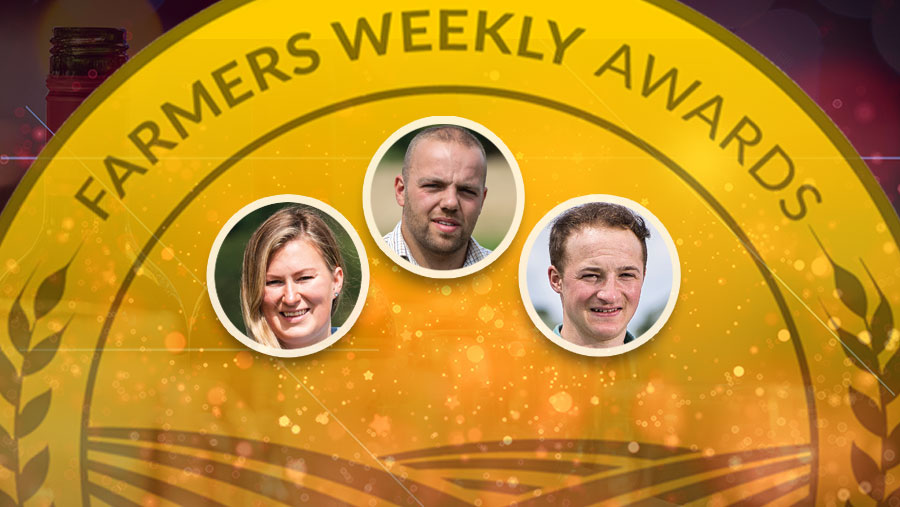 Young Farmer of the Year 2023 finalists
Young Farmer of the Year 2023 finalists Shouldering responsibility from a young age, this year’s finalists all share an entrepreneurial spirit and business instincts.
See also: The full list of shortlisted farmers for the 2023 Awards
The finalists
Luke Conway
Kinley Hill Farm, County Durham
Reuben Powell
Penpound, Powys
Hannah Reddaway
Tuckenhay Farm, Devon
The judges
The judging team visited each of the finalists for a three-hour interview and tour of their farms. The Young Farmer of the Year judges are:
Matthew Nichols, last year’s winner
Matilda Bovingdon, Farmers Weekly news and community reporter
Cath Crowther, regional director CLA East
Luke Conway
Kinley Hill Farm, County Durham
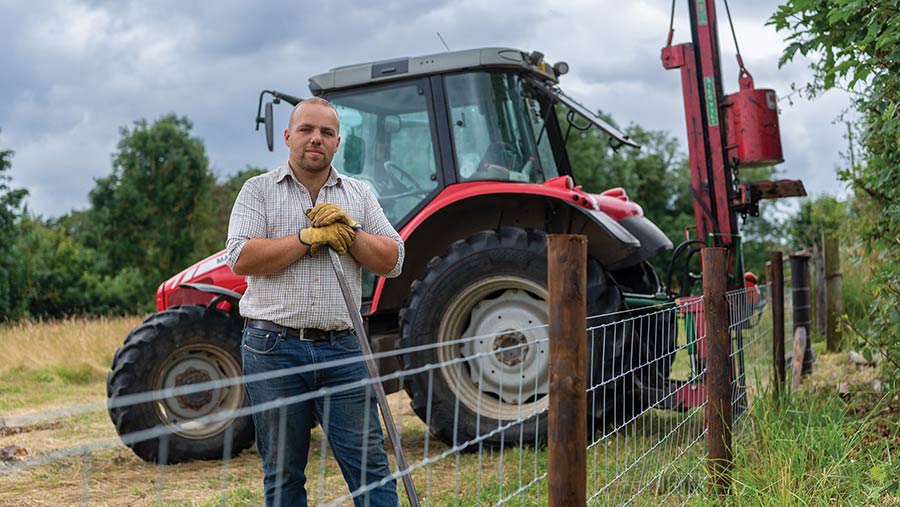
Luke Conway, Young Farmer of the Year 2023 finalist © Wayne Hutchinson
Farm facts
- Cattle returned to the farm after an absence of 35 years
- Formerly unused land has been planted with AB9 winter bird food
- This year’s pumpkin patch has a mix of varieties
- Luke hopes to start a boxed beef business once he has built up herd numbers
Fourth-generation young farmer Luke Conway has recently taken the reins of the family’s 73ha farm, which he runs in partnership with his aunt and uncle.
After studying for a diploma in agriculture at Houghall College, he found his passion for farming and was set on improving the farmland to build a viable business and diversifications upon.
In the past five years, he has reintroduced cattle to the farm and has built a pumpkin patch business.
Establishing a herd
Luke says one of his proudest achievements to date has been establishing his own herd of cattle, reintroducing them to the farm after a 35-year absence.
He set out his criteria for the herd, knowing he wanted something that required little input and would calve easily outdoors.
“We don’t have any shed space, so I knew I needed to pick a good hardy cattle breed,” he explains.
After swiftly deciding on native breed Belted Galloways, Luke bought his first two cattle in 2018, and has since been breeding them to build up his herd numbers. He now has a herd of 23 cattle on the farm, including some Highlands that he picked up from another local farmer.
“The cattle are making good use of land that was out of work,” he says. “They are helping bring it back into high productivity.”
A longer-term goal is to establish a boxed beef business to sell the farm’s produce direct to the consumer – something that Luke hopes to set up within the next year.
Pumpkin patch
One of the newest additions to the business is Kinley Hill Pumpkin Patch. Beginning last year, with the guidance of his Agrovista agronomist, Luke and his family planted 4,000 pumpkins by hand, nurturing and watering each plant with a watering can to ensure it survived last summer’s drought.
Something that had never been done on the farm, or in surrounding areas, Luke had faced a lot of adversity, but he was determined to see his vision through to completion.
The pumpkin patch was a huge success last year and attracted thousands of visitors to the farm throughout October.
This year, Luke has scaled up the patch, and is currently growing 9,000 plants, each planted by hand, with several different varieties. To make watering easier this year, Luke extensively researched, and installed, a new irrigation system to keep up with the extra volume of plants.
He is also growing a maize maze to go alongside the patch to create more of an attraction, so that visitors to the farm can have a family day out.
Stewardship
Improving the farmland and environment has been another of Luke’s priorities. He has entered the farm into a Mid Tier stewardship scheme to benefit both the wildlife and soil health, and has focused on parcels of land that have not grown crops for more than 20 years.
Admitting that removing roots and shrubs and ploughing was an extreme task, he says the overall benefits have been boundless.
He has also recently planted 4,000 new hedge plants as part of a stewardship scheme, replacing areas where they had become sparse, as well as coppicing where needed.
In the near future Luke hopes to construct a steel-framed shed to house the 500 bales of hay he makes each year, with one aim being to cut down on the amount of plastic he currently uses wrapping each bale to store outside. n
What the judges say:
Alongside embracing his passion by introducing cattle back to the farm, Luke saw a gap in the market for a local pumpkin patch and is exploring sustainable operations to bring land back into production.
Luke Conway summary
What the judges liked
- Focus on improving the land and soil health
- Determination in the face of adversity
- Huge commitment and family involvement in ensuring the pumpkin patch would be a success
- Promoting native breeds
The numbers
- 9,000 pumpkin plants being grown this year, up from 4,000 last year
- 16 Belted Galloways
- 7 Highland cattle
- 73 hectares
- 35 years since cattle last grazed on the farm
Reuben Powell
Penpound, Powys
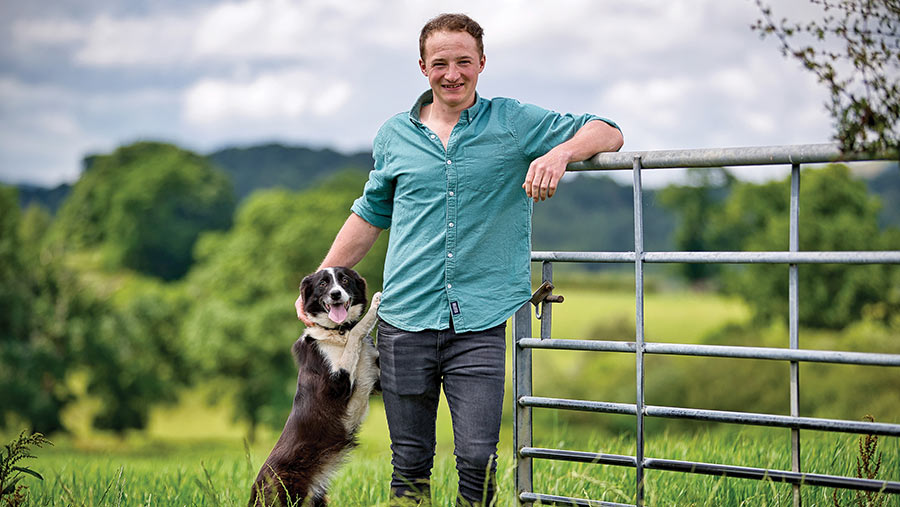
Reuben Powell, Young Farmer of the Year 2023 finalist © Richard Stanton
Farm facts
- Family business involves 2,000 ewes, plus suckler cows
- Broiler shed sits on 40ha plot
- Reuben visited 10 broiler sites before finalising design and layout of his operation
- Former prime minister David Cameron called the Welsh Sheeptacular the highlight of the Royal Welsh Show
Reuben Powell’s interest in the broiler industry first piqued when he was studying for a diploma in agriculture at Walford and North Shropshire College.
Originally from a mixed livestock background, with cattle and sheep on his family’s farm in Newbridge-on-Wye, he had no prior experience of the broiler sector, and subsequently found a job at a local unit to gain knowledge and begin looking into having his own setup.
Renewables
After taking on a 40ha site that his parents had bought in the early 2000s, Reuben went about the painstaking process of getting planning permission for his broiler unit.
Enlisting the help of a poultry business consultant and utilising Welsh farming grants, he was able to make decisions on every element of the new unit, including how it would be heated and ventilated.
With broiler farming being relatively power-hungry, made worse by the soaring energy prices seen in the spring of 2022, Reuben invested in an 80kW solar array for the roof of one of the sheds, and a further 150kW system to feed into 250kW of battery storage.
This accompanies a 480kW ground-source heating system.
While this was initially a daunting investment, Reuben hopes it will provide between 60-70% of the electricity needed to run the site, and will also ensure that the meat is produced using 100% renewable heat, which should appeal to more climate-conscious consumers.
High standards
After introducing the first chicks in October 2020, Reuben’s keen eye for detail and focus on high welfare has already paid off.
Last year he was awarded a prestigious Aviagen Ross 420 Gold Award.
To qualify, producers must have three consecutive crops with an EPEF score of 420 or above – something that Reuben has maintained for five consecutive crops.
Gold award winners are considered to be in the top 1% of broiler farmers in the UK, which Reuben says is hugely gratifying after the work and focus he has channelled into bird welfare and business results.
Family affair
When the Covid-19 pandemic hit and agricultural shows across the country were forced to close, Reuben’s family’s longstanding diversification, the Welsh Sheeptacular, also closed its doors.
Run by his uncle Clive, the showcase of 20 different breeds of sheep and a demonstration of shearing had been a huge part of Reuben’s childhood, and one he was reluctant to let go.
“It was always something I was proud of and looked forward to each summer, giving people an insight to the sheep industry and a brief education on why we do what we do, year on year,” says Reuben.
When life slowly began to return to normal after the pandemic, Reuben approached his uncle and agreed to revive the Sheeptacular, taking on the organisation and running, and immediately needing to source rams from 20 different breeds.
“This was no mean feat, because I’d missed the autumn ram sale season,” he says.
Under Reuben’s guidance, the Sheeptacular returned to the Royal Welsh Show in 2022.
While he freely admits it is a labour of love, Reuben has created a social media account and has set about boosting the profile of the display, and hopes to book three or four events each year to raise public awareness and interest in the sheep industry and promote Welsh agriculture.
What the judges say:
Reuben was willing to take the risk of a substantial investment in the poultry unit to develop a profitable business. Alongside this, he has taken on the Welsh Sheeptacular, showcasing the industry to the public.
Reuben Powell summary
What the judges liked
- Awarded prestigious Aviagen Ross 420 Gold Award
- Installing solar panels and commitment to sustainable farming
- Keeping family diversification alive
- Public engagement with the Welsh Sheeptacular
The numbers
- 240 hectares owned
- 60 hectares rented
- 100,000 birds
- 12 hectares of spring barley
- 20 rams for Welsh Sheeptacular
Hannah Reddaway
Tuckenhay Farm, Devon
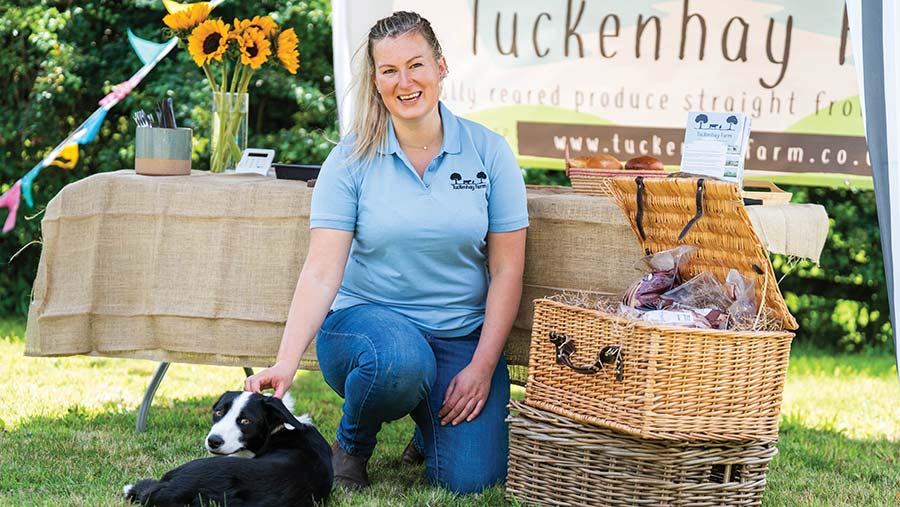
Hannah Reddaway, Young Farmer of the Year 2023 finalist © Emily Fleur
Farm facts
- The 222ha farm sustains three businesses
- Hannah’s father looks after beef cattle and her brother runs the dairy unit
- Hannah supplies meat boxes to both local customers and tourists
- Plans to offer farm tours and camping, which will provide a further pool of customers
Hannah Reddaway grew up on her family’s dairy, beef and arable farm in south Devon, but after studying for a degree in civil and structural engineering at the University of Sheffield, she went on to work as a chartered structural engineer in London for five years.
Admitting that working in agriculture was never a part of her plan, Hannah says she returned to the family farm when the pandemic struck, to work alongside her father and brother, while maintaining her engineering work on a part-time and remote basis.
Diversification
After learning the ropes on the family farm and spending time lambing with a neighbour, Hannah had the confidence to build up her own flock.
On land that she rents from her parents and a neighbour, she set about establishing a flock of 200 breeding ewes, and, after attending a talk by the Royal Countryside Fund, was inspired to diversify and safeguard the farm throughout the BPS transition period.
Her flock is at the heart of her meat box business – Tuckenhay Farm – but she is also keen to ensure that the business blends seamlessly with the beef and dairy enterprises run by her father and brother.
Learning the business
Using her business knowledge to secure local grant funding, Hannah set about taking courses in butchery and food hygiene, and used remaining funds for marketing, creating a website, and purchasing a commercial refrigerator.
She rents a small studio in one of the farm’s outbuildings and has established a premises from which she sells beef, from cattle that she purchases from her father, along with lamb and mutton directly from the farm.
“I’d never started a business on my own before,” Hannah admits, “so there have been a lot of different elements to learn about.”
Hannah’s boxed meat business has created a direct route to market for the family farm, and enables her to supply the local community and beyond, capitalising on the number of tourists visiting the area during the summer.
She says the business model allows her greater flexibility to meet customer needs, while also being able to reach a price point that is mutually agreeable as she sells products ranging from individual cuts through to a whole lamb.
Customers have the option of collecting their orders from the farm, while Hannah also makes deliveries herself throughout south and east Devon.
Future expansion
Now that the business is established, Hannah hopes to expand her flock numbers and introduce more native breeds of sheep and cattle, such as Grey Faced Dartmoors and Aberdeen Angus, both of which should thrive on the farm’s grassland.
“I’d also like to be able to promote the use of the whole animal,” she says. “But this will come in time, with me being able to do the butchery myself and have more control over the process.”
She is also moving more towards organic processes and farming sustainably.
“I’d like to expand the farm business into camping and farm tours,” she says. “Promoting the agricultural industry is really important to me, and these ventures will give people from outside the industry an insight and offer unique experiences to customers while contributing positively to the environment.”
Hannah has also just bought a sheepdog, and has been training her using videos from Emma Grey’s Sheepdog School.
What the judges say:
Hannah has achieved a lot in a short amount of time. She has developed her own business, using a variety of routes to market, and is keen to explore other diversifications to maximise future opportunities.
Hannah Reddaway summary
What the judges liked
- Making use of local grant funding to elevate the farm diversification
- Connection to the local community
- Using social media to reach new audiences and promote farming
- Environmental consciousness
The numbers
- 222 total hectares
- 40 hectares managed by Hannah
- 200 breeding ewes
- 2021 – the year Hannah started working on the farm
The FW 2023 Young Farmer of the Year is sponsored by Map of Ag
Sponsor’s message
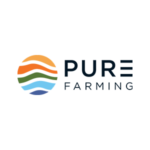 “It is fantastic to see a new generation of farmers applying advances in technology, data measurement and precision to traditional farming methods. Congratulations to you all.”
“It is fantastic to see a new generation of farmers applying advances in technology, data measurement and precision to traditional farming methods. Congratulations to you all.”
Joe Towers, senior account manager, Map of Ag

